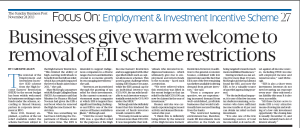MGR Accountants Mary McKeogh quoted in the Sunday Business Post’s coverage of the EII Scheme for tax relief.
 The removal of the Employment and Investment Incentive (EII) scheme from the High Income Earners’ Restriction (HIER) in the recent budget has been widely welcomed by businesses seeking to raise funds under the scheme, according to Sinead Heaney, partner in corporate investment at BDO.
The removal of the Employment and Investment Incentive (EII) scheme from the High Income Earners’ Restriction (HIER) in the recent budget has been widely welcomed by businesses seeking to raise funds under the scheme, according to Sinead Heaney, partner in corporate investment at BDO.
Since 2011, Heaney explained, a portion of the tax relief available under the scheme had been subject to the High Earners’ Restriction. “This limited the ability of high-earning individuals to benefit from the full tax relief, which has certainly impacted the level of funds raised since 2011,’’ she said.
Mary McKeogh, tax partner with McKeogh Gallagher Ryan (MGR) Accountants said that Minister for Finance Michael Noonan had given the EIIS a real boost when he removed the High Income Earners’ Restriction.
“This was something we had been lobbying the Department of Finance about for some time. The EIIS is intended to support indigenous companies in a diverse range of sectors and industries crucial to economic growth by encouraging investment,’’ she said.
“Investors are incentivised through the granting of tax relief for their investments. In the current economic environment many companies at which EIIS is targeted face significant funding challenges and EIIS is one of the few sources of finance available to them,’’ McKeogh said.
“Until the recent budget, EIIS was a specified relief for the purposes of the High Income Earners’ Restriction and was aggregated with other specified reliefs such as capital allowances schemes. This posed a great challenge when raising EIIS finance because, while the EIIS annual cap for an individual investor was €150,000, the tax relief available to such investors was potentially restricted to €80,000 under the HIER.’’
McKeogh said she definitely found that this hindered the amount of funds investors would commit to EIIS. “For many, it made no sense to invest more than €80,000. It was inequitable that individuals who invested in indigenous businesses – which ultimately give rise to employment and return funds to the economy – faced such a restriction.
“We were relieved when this restriction was lifted in the recent budget so that tax relief for the full €150,000 can now be claimed in the year of investment.’’
Heaney said she was certainly experiencing increased activity and demand from investors this year. “I think this is definitely being driven by the removal of the High Income Earners’ Restriction. However, in addition to the general economic bounce, combined with low interest rates and the fact that EII is one of the few remaining tax shelters available is driving demand from private investors,’’ she said.
“From a company perspective, we are experiencing increased demand from well-established, profitable businesses that would traditionally have secured funding from the banks. “The restricted banking environment has, therefore, made EII investments more attractive as the funds are being targeted towards much more established businesses.’’
Having worked as a tax advisor for more than 20 years, McKeogh said she had always found the BES, and now the EIIS, to be a valuable source of tax relief approaching year end. “For the individual taxpayer, it is one of the few income tax shelters remaining, so investors who have sufficient income taxable at 41 per cent can obtain tax relief on their investment.
“It is also one of the few remaining sources of total income relief, so it can be offset against all income sources, including PAYE income self-employed income and rental income,’’ said McKeogh.
“EIIS is also a short-term investment. Investors do not need recurring tax exposure every year – they only need a tax liability this year. It is also very accessible.
“All these factors serve to make EIIS a very attractive means of saving tax and availing of a low-risk investment opportunity. The closing date is usually December 31, and we have certainly had a lot of interest already.’’
This article appeared in the Sunday Business Post print edition on 24 November 2013
